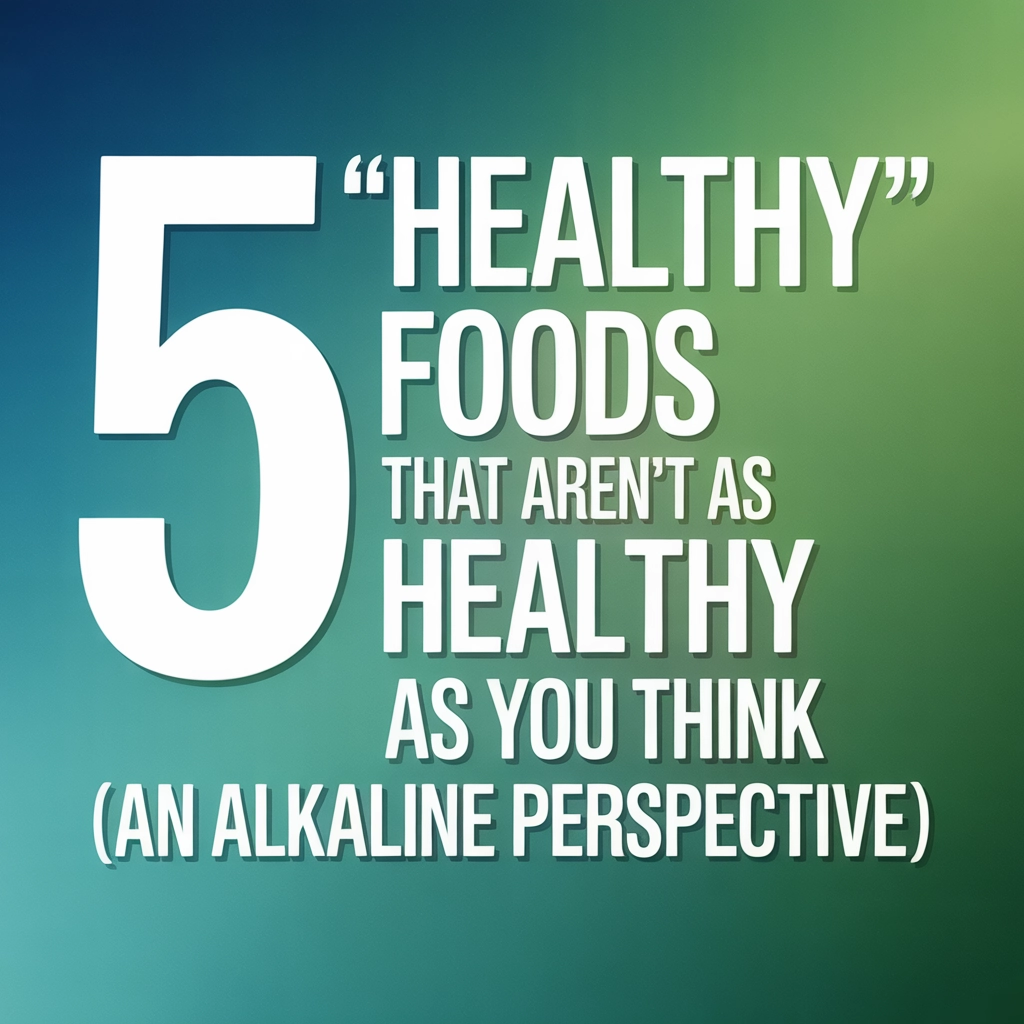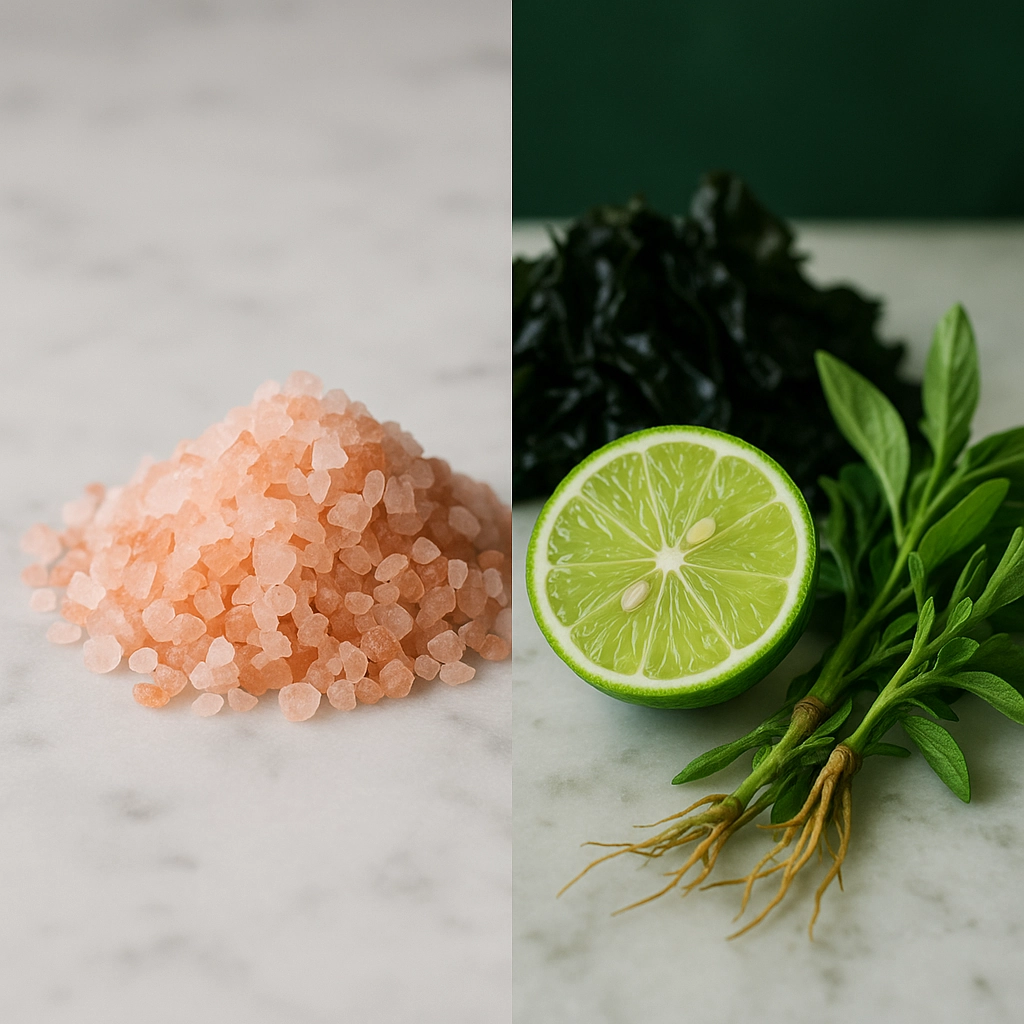Your cart is currently empty!
5 “Healthy” Foods That Aren’t as Healthy as You Think

The Alkaline Truth About Popular “Health” Foods
In the wellness world, certain foods have achieved almost untouchable “health halo” status. Health coaches, Instagram influencers, and even some nutritionists promote these foods as essential components of a healthy diet. But what if I told you that many of these celebrated foods might actually be working against your wellness goals, particularly from an alkaline perspective?
At Alkaline Eclectic Herbs, we believe in looking beyond conventional wisdom to understand how foods truly interact with our bodies on a cellular level. The alkaline approach to nutrition focuses on foods that help maintain the body’s optimal pH balance, supporting natural healing processes and promoting overall wellness.
Today, I’m pulling back the curtain on five popular “health” foods that might not deserve their stellar reputations. If you’ve been incorporating these into your diet religiously, you might be surprised to learn about their hidden downsides—and what to eat instead.
Understanding the Alkaline Approach
Before we dive into specific foods, let’s quickly understand what makes a food “alkaline” or “acidic” in the body. Contrary to what many believe, a food’s pH before consumption doesn’t necessarily determine its effect on your body. Instead, it’s about how the food metabolizes and what residue it leaves behind.
Acid-forming foods create acidic residue in the body, which can lead to mineral depletion as your system works overtime to neutralize this acidity. The goal of an alkaline diet is to minimize this unnecessary burden on your body’s self-regulating systems.
“Your body will do anything it can to maintain a slightly alkaline blood pH of 7.365. When we consume too many acid-forming foods, our bodies must pull minerals from our bones, teeth, and organs to neutralize the acid. This leads to mineral deficiencies and numerous health problems.” – Dr. Sebi, pioneering alkaline health advocate
Now, let’s look at these supposedly “healthy” foods and understand why they might not deserve their stellar reputation.
1. Brown Rice: The Whole Grain Deception
Brown rice is constantly celebrated as a healthy alternative to white rice. Health coaches promote it as a fiber-rich, nutrient-dense whole grain that should be a staple in healthy diets. But is it really supporting your health goals?
The Problem with Brown Rice
Despite being less processed than white rice, brown rice still presents several concerns from an alkaline perspective:
- Acid-Forming: Brown rice metabolizes to form acidic residue in the body, contributing to overall acidity
- Phytic Acid Content: Contains high levels of phytic acid, an anti-nutrient that binds to essential minerals like zinc, iron, and calcium, preventing their absorption
- Inflammatory Potential: For many people, grains like rice can trigger mild inflammatory responses
- Modern Agriculture Impact: Often grown with pesticides and in mineral-depleted soil, reducing its nutritional value
The Alkaline Alternative
Instead of brown rice, consider these truly alkaline grain alternatives:
- Quinoa (properly soaked)
- Amaranth
- Wild rice (not technically a grain but a grass seed)
- Spelt (when properly prepared)
Or better yet, try cauli-rice (riced cauliflower) or hemp seed as low-carb, alkaline-forming alternatives that provide more nutrients without the acid-forming effects.
2. Sweet Potatoes: Not-So-Sweet Truth
Sweet potatoes have achieved superfood status in recent years. Their vibrant orange color, rich taste, and reputation as a “complex carb” have made them a favorite among health enthusiasts.
The Hidden Downsides of Sweet Potatoes
From an alkaline perspective, sweet potatoes come with several concerns:
- High Starch Content: Sweet potatoes are loaded with starch that converts to sugar in the body
- Blood Sugar Spikes: Despite being marketed as a “complex carb,” they can still cause significant blood sugar elevations
- Hybridization: Modern sweet potatoes have been bred for sweetness and size, increasing their sugar content
- Inflammatory Effects: The blood sugar spikes can contribute to inflammation and hormone imbalances
- Poor Choice for Healing: Not ideal for those dealing with inflammatory conditions, trying to lose weight, or addressing hormonal issues
Alkaline Alternatives
Instead of sweet potatoes, try these alkaline-friendly options:
- Chayote squash
- Yellow squash
- Butternut squash
- Kabocha squash
- Zucchini
These vegetables provide the satisfying texture and versatility of sweet potatoes without the starch overload and blood sugar concerns.

3. Kombucha: The Fermented Facade
Kombucha has exploded in popularity as a gut-healing, probiotic-rich health elixir. With its tangy flavor and fizzy texture, it’s been marketed as a healthy alternative to soda and a daily digestive tonic.
Why Kombucha Falls Short
Despite its reputation, kombucha presents several concerns:
- Sugar Content: Even after fermentation, kombucha retains significant sugar content
- Caffeine Presence: Made from black or green tea, kombucha contains caffeine, which can be disruptive to adrenal health
- Alcohol Levels: Contains small amounts of alcohol (typically 0.5-2%) as a byproduct of fermentation
- Acidic Nature: While containing beneficial acids, kombucha itself is highly acidic and can exacerbate issues for those with acid reflux or sensitive digestion
- Commercial Processing: Store-bought varieties often contain additives or are pasteurized, killing beneficial bacteria
“Many so-called health foods contain hidden ingredients that work against the body’s natural healing processes. When choosing fermented foods, it’s essential to look beyond marketing claims to understand what’s really in your bottle or jar.” – Dr. Robert Morse, Natural Health Practitioner
Alkaline-Friendly Alternatives
Instead of kombucha, consider these truly beneficial options for gut health:
- Spring water with fresh lemon or lime
- Herbal infusions (Red Clover, Mugwort, Linden)
- Coconut water (properly prepared)
- Fresh vegetable juices
These alternatives provide hydration and beneficial compounds without the downsides of kombucha.
4. Cashews: The Problematic Nut
Cashews have become a staple in plant-based diets, used for everything from dairy-free cheese to creamy sauces. They’re celebrated for their protein content and heart-healthy fats.
The Truth About Cashews
From an alkaline perspective, cashews aren’t the health food they’re made out to be:
- Hybrid Nature: Cashews are not found in nature as we know them today; they’ve been extensively hybridized
- Acid-Forming: Despite being nuts, cashews metabolize to create acidic residue in the body
- Processing Methods: Often roasted in harmful seed oils, adding inflammatory compounds
- Digestive Strain: Their dense nature makes them difficult for many people to digest properly
- Mold Risk: Susceptible to mold and aflatoxins, especially when not stored properly
Better Alkaline Options
Instead of cashews, try these alkaline-supporting nuts and seeds:
- Hemp seeds
- Sesame seeds
- Walnuts (in moderation)
- Brazil nuts (limit to 2-3 per day due to high selenium)
These alternatives provide healthy fats and protein without the acid-forming effects of cashews.
5. Spinach: The Oxalate Overload
Spinach has long been the poster child for healthy greens. From Popeye to modern smoothie bowls, this leafy green is consistently promoted as a nutritional powerhouse.
The Spinach Problem
Despite its nutrient content, spinach has several concerning attributes:
- High Oxalate Content: Contains extremely high levels of oxalates, compounds that bind to minerals
- Mineral Blocking: Oxalates prevent the absorption of calcium, iron, and other essential minerals
- Kidney Strain: Can contribute to kidney stone formation in susceptible individuals
- Thyroid Impact: Contains compounds that can interfere with thyroid function when consumed raw in large amounts
- Conventional Growing Methods: Often high in pesticide residues when not organic
Alkaline-Friendly Greens
Instead of relying heavily on spinach, rotate in these lower-oxalate, alkaline-forming greens:
- Kale (when properly prepared)
- Watercress
- Arugula
- Dandelion greens
- Mustard greens
These alternatives provide similar nutrients without the high oxalate content of spinach.
Making the Transition to Truly Alkaline Foods
If you’ve been including these “health” foods in your diet regularly, don’t panic. The body is remarkably resilient, and making gradual changes can lead to significant improvements in how you feel.
Here are some practical steps to transition to a more authentic alkaline approach:
- Start with substitutions: Begin by replacing one “problematic” food at a time rather than overhauling your entire diet at once
- Focus on variety: Rotate your greens, nuts, and other foods to ensure you’re not over consuming any one item
- Proper preparation matters: Learn techniques like soaking, sprouting, and proper cooking methods to reduce anti-nutrients in plant foods
- Listen to your body: Pay attention to how you feel after consuming different foods—your body often provides the best feedback
- Gradual transitions: Allow your taste buds and digestion time to adapt to new foods and flavors

The Bigger Picture: Beyond Individual Foods
While focusing on specific foods is important, remember that overall dietary patterns matter more than individual items. A truly healing diet includes:
- Abundant mineral-rich vegetables
- Properly prepared seeds and nuts
- Fresh herbs and spices
- Clean, structured water
- Minimal processed foods
- Limited sugar and stimulants
“Health isn’t just about what you eat, but how that food interacts with your unique biochemistry. The alkaline approach isn’t about perfection—it’s about making informed choices that support your body’s natural healing capacity.” – Dr. Sebi
Take Action: Your Next Steps Toward Alkaline Balance
Now that you’re aware of these commonly misrepresented “health” foods, here are some practical steps to take:
- Assess your current diet: Take inventory of how often you consume these five foods
- Make a substitution plan: Choose one food to replace this week with a better alternative
- Educate yourself: Continue learning about the alkaline approach to health through our blog and resources
- Try new foods: Commit to trying one new alkaline-friendly food each week
- Consider supplements: While transitioning, you may benefit from mineral supplements that support alkaline balance
You can do this alone or sign up for our START UP program which includes everything you need including a food sensitivity test and mineral deficiency analysis, weekly 1-on-1 coaching, herbs, supplements and the proven strategy for progress and results.
At Alkaline Eclectic Herbs, we’re committed to helping you navigate the often confusing world of nutrition with evidence-based, practical information. Our herbal products are specifically designed to support your journey toward alkaline balance and optimal health.
Have you been consuming any of these foods regularly? Which alternative are you most excited to try? Share your thoughts and experiences in the comments below!
Remember, true health isn’t found in following trends or superficial advice—it comes from understanding how foods interact with your unique body and making choices that support your natural healing processes.
